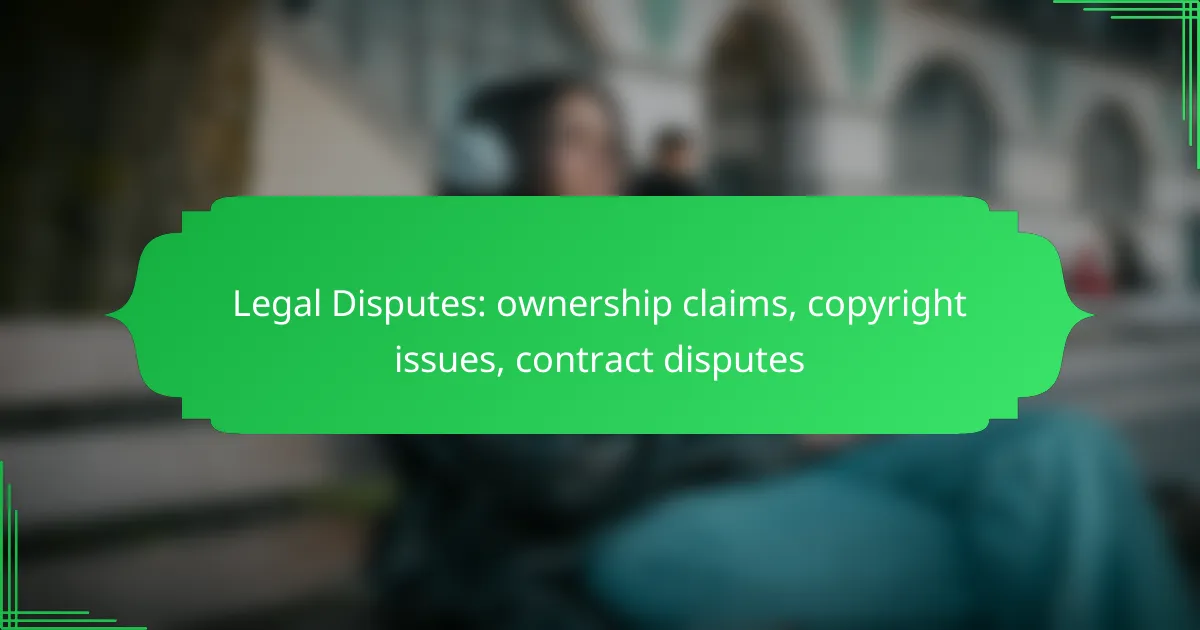Legal disputes often arise from ownership claims, copyright issues, and contract disagreements, each presenting unique challenges. In the UK, these disputes can involve intricate legal frameworks and require a thorough understanding of rights and responsibilities. Effective resolution may involve negotiation, mediation, or litigation, depending on the nature of the conflict and the parties involved.
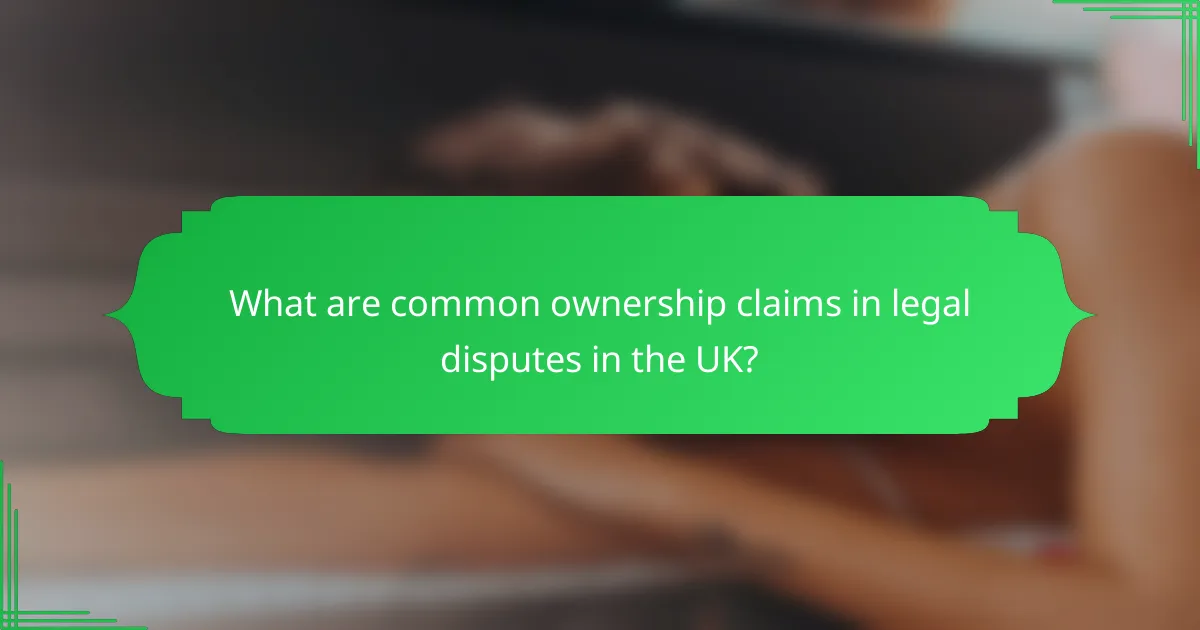
What are common ownership claims in legal disputes in the UK?
Common ownership claims in legal disputes in the UK often involve property ownership, intellectual property rights, and joint ownership issues. These claims can arise in various contexts, leading to complex legal battles that require careful consideration of rights and responsibilities.
Property ownership claims
Property ownership claims typically arise when there is a dispute over the rightful owner of a physical asset, such as land or buildings. In the UK, these claims may involve issues like boundary disputes, adverse possession, or disputes arising from inheritance. It’s crucial to gather relevant documentation, such as title deeds and land registry records, to support your claim.
When pursuing a property ownership claim, consider the potential costs involved, including legal fees and court expenses. Many disputes can be resolved through negotiation or mediation, which may save time and money compared to litigation.
Intellectual property ownership claims
Intellectual property ownership claims involve disputes over rights to creations such as inventions, designs, trademarks, and copyrights. In the UK, these claims can arise when one party believes their intellectual property has been infringed upon or improperly used by another party. Understanding the specific type of intellectual property involved is essential for determining the appropriate legal recourse.
To strengthen an intellectual property claim, ensure that you have registered your rights where applicable, such as trademarks or patents. Keep detailed records of creation and usage, as these can serve as vital evidence in disputes.
Joint ownership disputes
Joint ownership disputes occur when two or more parties claim ownership over a shared asset, leading to conflicts regarding rights, responsibilities, and profit-sharing. In the UK, these disputes often arise in family situations, partnerships, or co-owned properties. Clear agreements outlining each party’s rights can help prevent misunderstandings.
In resolving joint ownership disputes, consider mediation as a first step to reach an amicable solution. If mediation fails, legal action may be necessary, but this can be costly and time-consuming. Always seek legal advice to understand your options and the implications of any agreements made.
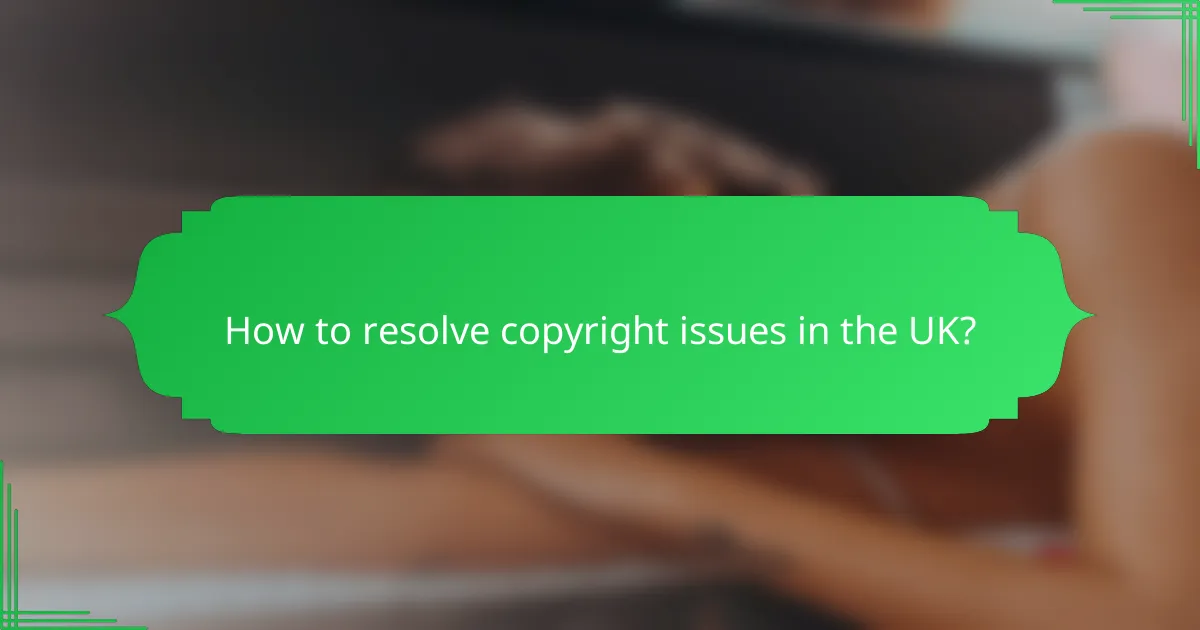
How to resolve copyright issues in the UK?
Resolving copyright issues in the UK typically involves understanding the legal framework surrounding copyright law, identifying the nature of the dispute, and seeking appropriate remedies. Common methods include negotiation, mediation, or, if necessary, litigation in court.
Copyright infringement claims
Copyright infringement claims arise when someone uses a copyrighted work without permission from the rights holder. In the UK, the copyright owner can take legal action against the infringer, which may result in financial compensation or an injunction to stop the infringing activity.
To pursue a claim, the copyright owner must demonstrate ownership of the work and that the infringement occurred. This often involves gathering evidence of the unauthorized use and may require legal assistance to navigate the complexities of copyright law.
Fair use doctrine in copyright
The fair use doctrine, known as “fair dealing” in the UK, allows limited use of copyrighted material without permission under specific circumstances. This includes purposes such as criticism, review, news reporting, teaching, and research, but it is subject to strict criteria.
To qualify for fair dealing, the use must be fair and not harm the market for the original work. Factors considered include the purpose of the use, the nature of the work, the amount used, and the effect on the market. It’s advisable to seek legal advice to ensure compliance with these guidelines and avoid potential infringement claims.

What are the steps to handle contract disputes in the UK?
Handling contract disputes in the UK typically involves negotiation, mediation, and litigation. Each step offers different approaches to resolving conflicts, allowing parties to choose the most suitable method based on their specific circumstances.
Negotiation strategies
Negotiation is often the first step in resolving contract disputes. It involves direct discussions between the parties to reach a mutually acceptable agreement without formal proceedings. Effective strategies include preparing thoroughly, understanding the other party’s interests, and being willing to compromise.
Consider using techniques such as active listening and open-ended questions to facilitate dialogue. Setting clear objectives and knowing your bottom line can help guide the negotiation process. Avoiding aggressive tactics can also foster a more collaborative atmosphere.
Mediation processes
Mediation is a structured process where a neutral third party helps facilitate discussions between disputing parties. The mediator does not make decisions but assists in finding common ground. This method is often quicker and less expensive than litigation.
In the UK, mediation can be voluntary or court-ordered. It’s essential to choose a mediator with relevant experience and to prepare for the session by gathering necessary documents and clarifying your goals. Successful mediation can lead to a binding agreement, which can be enforced in court if necessary.
Litigation options
If negotiation and mediation fail, litigation may be necessary. This involves taking the dispute to court, where a judge will make a binding decision. It’s crucial to understand that litigation can be time-consuming and costly, often requiring legal representation.
In the UK, small claims can be handled in the Small Claims Court, which is designed for disputes involving lower amounts, typically up to £10,000. For larger claims, the High Court may be appropriate. Be aware of the potential for appeals and the importance of adhering to court rules and timelines throughout the litigation process.

What are the legal frameworks for ownership claims in the UK?
The legal frameworks for ownership claims in the UK primarily involve statutory regulations that govern property rights and intellectual property. Understanding these frameworks is crucial for resolving disputes related to ownership, whether for real estate or creative works.
Land Registration Act 2002
The Land Registration Act 2002 provides a comprehensive system for registering land ownership in England and Wales. It aims to simplify the process of land transactions and enhance the security of property rights.
Under this Act, ownership claims must be registered with the Land Registry, which maintains a public record of land ownership. This registration process helps establish clear title and can prevent disputes over land ownership.
For effective claims, ensure all relevant documents, such as title deeds and transfer agreements, are accurately submitted. Failure to register can lead to complications in asserting ownership rights.
Copyright, Designs and Patents Act 1988
The Copyright, Designs and Patents Act 1988 governs copyright ownership in the UK, protecting original works such as literature, music, and art. This law grants creators exclusive rights to their works, allowing them to control reproduction and distribution.
Ownership under this Act is automatic upon the creation of a work, but registering copyright can strengthen claims in disputes. It’s advisable for creators to keep detailed records of their work and any agreements related to its use.
When navigating copyright claims, be aware of the duration of protection, which typically lasts for the creator’s lifetime plus an additional 70 years. Understanding these timelines is essential for managing rights effectively.

How do copyright laws differ across the UK?
Copyright laws in the UK vary between regions, primarily between England and Wales, and Scotland. Each jurisdiction has its own nuances in terms of enforcement, duration, and specific regulations that affect copyright ownership and claims.
England and Wales copyright laws
In England and Wales, copyright is governed by the Copyright, Designs and Patents Act 1988. This law provides automatic protection for original works, including literature, music, and art, without the need for registration. Copyright typically lasts for the lifetime of the creator plus 70 years.
Creators should be aware of the moral rights associated with their works, such as the right to attribution and the right to object to derogatory treatment. Licensing agreements are crucial for transferring rights, and it’s advisable to have clear contracts to avoid disputes.
Scotland copyright laws
Scotland follows the same Copyright, Designs and Patents Act 1988 as England and Wales, but there are some differences in the legal framework and enforcement. For instance, Scottish law has distinct procedures for resolving copyright disputes, often involving the Court of Session.
In Scotland, the concept of “moral rights” is also recognized, similar to the rest of the UK. However, practitioners should be mindful of the specific legal terminology and practices that may differ, particularly in contractual agreements and dispute resolution processes.
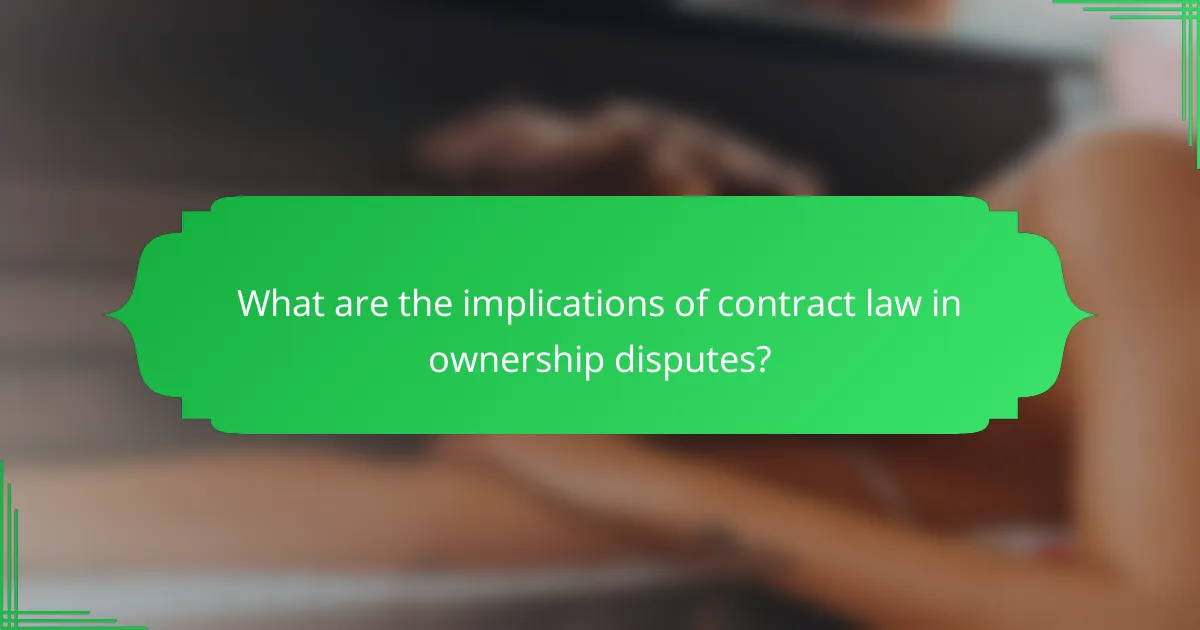
What are the implications of contract law in ownership disputes?
Contract law plays a crucial role in ownership disputes by establishing the legal framework for agreements between parties. Understanding the implications of contract law helps in determining rights, responsibilities, and potential remedies when ownership claims arise.
Contract validity criteria
For a contract to be valid in ownership disputes, it must meet several criteria, including mutual consent, lawful purpose, and consideration. Both parties must agree to the terms, and the contract must not violate any laws or public policy.
Additionally, the parties involved must have the legal capacity to enter into a contract, meaning they should be of legal age and sound mind. If any of these criteria are not met, the contract may be deemed void or unenforceable.
Remedies for breach of contract
When a breach of contract occurs in ownership disputes, several remedies may be available to the aggrieved party. The most common remedies include specific performance, where the court orders the breaching party to fulfill their contractual obligations, and monetary damages, which compensate the injured party for losses incurred.
Other remedies may include rescission, which cancels the contract, or reformation, which modifies the contract to reflect the true intentions of the parties. The choice of remedy often depends on the nature of the breach and the specific circumstances surrounding the dispute.
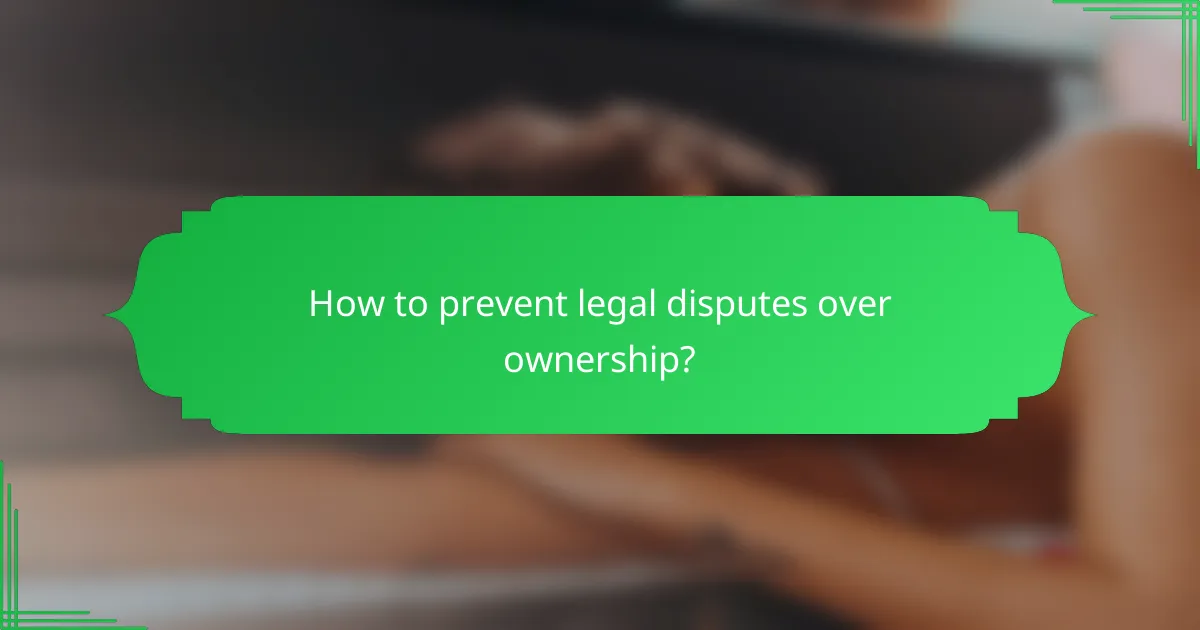
How to prevent legal disputes over ownership?
To prevent legal disputes over ownership, establish clear agreements and maintain thorough documentation. This proactive approach minimizes misunderstandings and provides a solid foundation for resolving potential conflicts.
Clear documentation practices
Implementing clear documentation practices is essential for preventing ownership disputes. This includes keeping detailed records of agreements, communications, and any changes made over time. Ensure that all parties involved have access to these documents to foster transparency.
Use standardized contracts that outline ownership rights, responsibilities, and expectations. Incorporate specific clauses that address potential issues, such as dispute resolution processes and intellectual property rights. Regularly review and update these documents to reflect any changes in circumstances or agreements.
Consider maintaining a centralized digital repository for all documentation. This can include contracts, emails, and meeting notes, making it easier to retrieve information when needed. Additionally, ensure that all parties acknowledge and sign off on key documents to reinforce their commitment and understanding.
